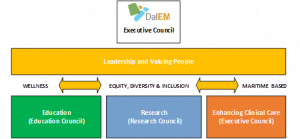This past spring, DalEM embarked on a new process to revamp its strategic plan. The department had developed a new strategic plan in 2019, based on extensive engagement with stakeholders in NS, NB and PEI, but this process was derailed. The plan was in its final stage of preparation for launch in early 2020, when everything was put on pause as all efforts shifted to focus on the emerging COVID pandemic. Three years later, the department executive felt it was essential to regroup and confirm that the strategic direction, priorities and goals of the department were still in line with current and emerging needs and priorities in the health-care system and broader Maritime community, post-pandemic.

DalEM members took a wilderness stroll as part of the strategic planning retreat
To build on the broad consultation efforts of 2019, the 2023 initiative looked to smaller focus groups and interactive follow-up sessions to refine the plan and its language, culminating in the DalEM strategic planning retreat in Moncton in June. This led to an inclusive and innovative update that incorporates the revised Dalhousie Faculty of Medicine Strategic Plan at its foundation.
The end result is an updated plan the department will use in “Charting the Future of Emergency Medicine” across the Maritimes. The various aspects of the plan presented below will serve as touch points across the department, helping members determine priorities in light of where we are working towards being in 2028.
Here are the essentials of the 2023 DalEM strategic plan, Charting the Future of Emergency Medicine:
Vision: A world-leading, distributed, integrated, Maritime-based academic department of emergency medicine.
Mission: To advance the practice of emergency medicine through high-impact research and innovative, top-quality education.
Values:
Respect—Work and learning environments grounded in kindness and a high regard for the aspirations, rights and traditions of all. Collegial, professional relationships that build feelings of trust, empathy, compassion, safety, and wellbeing.
Inclusion—A diverse mix of outstanding students, clinicians, scholars, researchers and staff who share an enriched sense of belonging and commitment to action. The power of diversity demonstrated through inclusive engagement with our communities.
Collaboration—Genuine appreciation for what is important to one another, our partners and those whom we serve. Building strong, productive relationships.
Accountability—Providing people with the tools, time and other resources they need to do their work. Setting the bar high for integrity in transparent communication. Setting new standards for high-quality and equitable approaches to medical education, research and clinical practice.
Innovative Excellence—A passion for continuous growth in individuals, communities, populations and the specialty of emergency medicine. An ongoing commitment to sustainable quality improvement.
Areas of Strategic Focus:
Excellence in Education
- Develop health-care professionals with the knowledge, skills, attitudes and professional competencies to deliver quality emergency care.
- Provide a learning environment which cultivates a growth mindset and lifelong education that is receptive to the needs of various learners across all stages of their careers.
- Support scholarship and innovation in emergency medicine education.
High-Impact Research - Cultivate infrastructure and an environment that is conducive to collaborative research.
- Perform and promote clinically relevant research that enhances health care and health outcomes.
- Maximize knowledge translation and implementation. Enhancing Clinical Care and Population Health
- Advocate for excellence in emergency care across all dimensions of quality [safety, outcomes, patient experience, efficiency, equity].
- Advocate for important health-system reforms at the university, health authority, provincial, national and international levels.Excellence in Leadership and Valuing People
- Provide good governance ensuring streamlined processes are managed by appropriate leaders, committee structures, team members and administrative support.
- Supporting and valuing people with clear communication of strategic directions, operational goals and priorities.
- Establish principles and practices for ongoing fiscal responsibility through fair and competitive funding of programs and individuals, as well as transparent and priority-guided budgeting and practice plans.
- Develop a systematic approach to creating a positive, satisfying and enjoyable working environment that promotes wellness.
Cross-Cutting Themes:
Equity, diversity and inclusion
Wellness
Maritime-based
Governance Structure:
Executive Council
Education (Education Council)
Research (Research Council)
Enhancing Clinical Care (Executive Council)
Leadership and Valuing People

Next Steps:
DalEM’s various committees will continue to work on the details of the strategic plan throughout the fall and winter. In particular, they will establish measures of success and targets of achievement. This next step is essential to ensure the department creates clear targets and can objectively measure the results of its efforts. A key priority in this process will be ensuring the engagement of leaders from across the Maritimes, in particular our partners from the Saint John Regional Hospital ED.